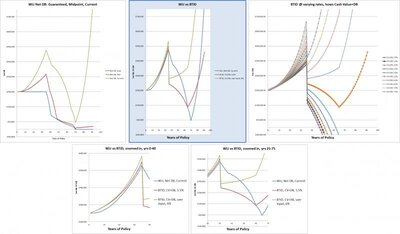- 11,284
Yeah, he's stuck in comparing rates of return only. Of course, that's not the only factor in a life insurance policy.
I wonder what the rate of return was for Walt Disney when he was building Disneyland and he couldn't get approved for a bank loan, but he borrowed from his life insurance policy? I wonder how well that one did for him?
Or Pampered Chef?
Or JC Penney?
Or John McCain (Well, that one went badly because he lost his presidential campaign, but at least he had it to waste!)
Sometimes liquidity is more important than rate of return for emergency or opportunities that come around.
I wonder what the rate of return was for Walt Disney when he was building Disneyland and he couldn't get approved for a bank loan, but he borrowed from his life insurance policy? I wonder how well that one did for him?
Or Pampered Chef?
Or JC Penney?
Or John McCain (Well, that one went badly because he lost his presidential campaign, but at least he had it to waste!)
Sometimes liquidity is more important than rate of return for emergency or opportunities that come around.


